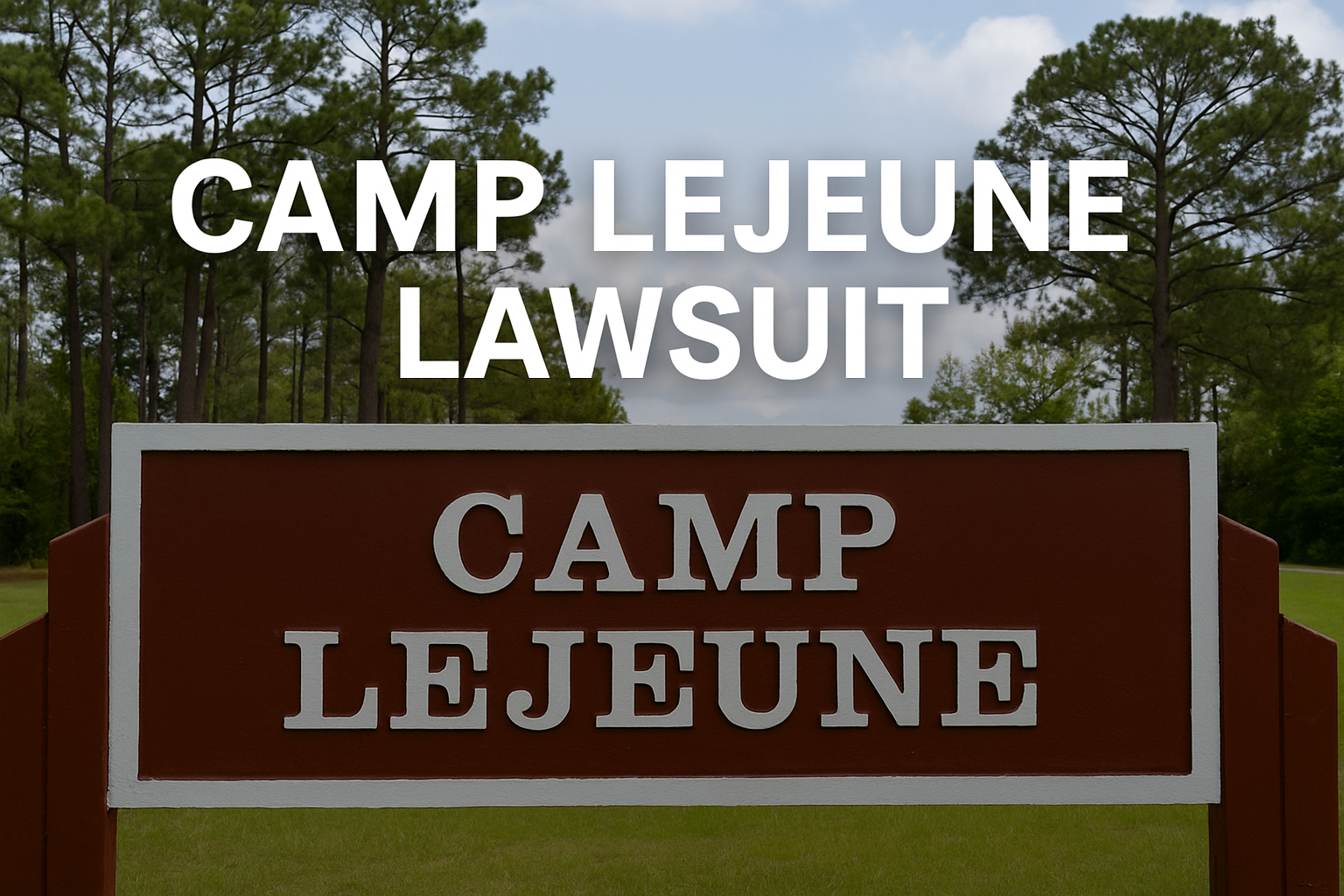Toxic water at Camp Lejeune harmed thousand of military families, workers and children. Many people drank and bathed in the water every day without knowing it was dangerous. The contamination went on for decade. Some people only learned about the health risk years later after serious illnesses appeared.
From 1953 to 1987, the water at Camp Lejeune contained harmful chemical. These included benzene, vinyl chloride and trichloroethylene—all linked to cancer and birth defects. The government failed to warn resident. As a result many people suffered from cancer, miscarriages and other life threatening condition.
This article breaks down the Camp Lejeune lawsuit in simple terms. You will learn:
-
Who qualifies to file a claim
-
What caused the water contamination
-
What illnesses the lawsuit covers
-
How to file your claim
If you or a loved one lived or worked at Camp Lejeune between 1953 and 1987 this guide will help you take the next step toward justice and financial recovery.
What Caused the Camp Lejeune Lawsuit?
Camp Lejeune is a large US. Marine Corps base located in Jacksonville North Carolina. The US government built it in 1941 as a major training and operation center for Marines. Over the year it became home to active duty troop civilian worker and military families. Between 1953 and 1987 more than one million people lived or worked on the base.
During this time the water supply at Camp Lejeune became dangerously contaminated. Underground storage tank leaked fuel and oil into the soil. Off base dry cleaner released toxic chemical into nearby drain. The military used industrial solvent to clean machinery and weapon and those substance seeped into the groundwater.
These pollutant made their way into the base water system. As a result people used this contaminated water daily for drinking cooking and bathing. No one warned them. Many exposed individuals later developed serious health condition including cancer birth defects liver problems and infertility.
Reports from the Environmental Protection Agency showed that the water contained hazardous substance at levels hundred to thousand of time higher than legal safety limit. Despite early sign of contamination in the 1970 the problem continued for year. Official delayed action and many victim remained unaware of the danger.
The Camp Lejeune water crisis became one of the worst case of environmental negligence in US military history.
What Did the Water Contain?
Tests showed the water had high level of toxic substance. These included:
-
Trichloroethylene
-
Tetrachloroethylene
-
Benzene
-
Vinyl chloride
These chemical are known to cause cancer and other health problem. Some levels were over 3000 times higher than safety standards.
What Health Issues Can It Cause?
The chemicals in the water caused serious illnesses. Many people suffered from:
-
Kidney cancer
-
Bladder cancer
-
Liver cancer
-
Leukemia
-
Breast cancer
-
Lung cancer
-
Non-Hodgkin’s lymphoma
-
Esophageal cancer
-
Female infertility
-
Miscarriage
-
Multiple myeloma
-
Renal toxicity
-
Scleroderma
-
Myelodysplastic syndrome
What Is the Camp Lejeune Justice Act
In 2022 Congress pass the Camp Lejeune Justice Act. This law gives victim a chance to sue the US government.
You can file if:
-
You lived or worked at Camp Lejeune for at least 30 day
-
Your time on base was between August 1 1953 and December 31 1987
-
You have a condition link to toxic water exposure
This law covers military members, civilian worker and family member. Even those exposed in utero may qualify.
How Is This Law Different?
Previous laws gave some veterans access to VA benefits. Those laws did not allow lawsuits. The new law changes that.
Now, you can file for financial compensation, not just health care. This include damage for pain, lost income and wrongful death.
How Much Is the Settlement
Lawyers estimate that total payout may reach $21 billion. Victims may receive between $10000 and $1 million. The payout depend on:
-
Type of illness
-
Length of time spent at the base
-
Strength of medical proof
-
Lost wages and medical bill
Some preset payout tiers range from $100,000 to $550,000 based on illness.
Who Can File a Claim?
To file, you must meet these requirement:
-
You lived worked or served at Camp Lejeune for 30 day or more
-
You have proof of diagnosis for a listed condition
Also, family members can file on behalf of deceased loved ones. Victims exposed in the womb may also file.
What Documents Do You Need?
To support your claim, gather:
-
Proof of base residence (housing orders, letters, records)
-
Medical records with diagnosis and treatment dates
-
Medical bills and insurance statements
-
Travel records or military duty logs
-
Disability or VA benefit documentation
Strong evidence increases your chance of a higher payout.
What Damages Can You Claim?
Victims may claim:
-
Medical costs
-
Lost wages
-
Pain and suffering
-
Disability benefits
-
Loss of companionship
-
Loss of enjoyment of life
-
Permanent disability
Your attorney will help calculate the right amount.
What Should You Do Next
If you live or worked at Camp Lejeune between 1953 and 1987 and develope a related illness you should take action now. The first step is to talk to a lawyer who understand Camp Lejeune lawsuit. An experienced attorney can review your case explain your right and help you collect the record you need to file a strong claim.
These claim are not handled in local court. All lawsuit must go through the US District Court for the Eastern District of North Carolina. This is the only court allowed to manage Camp Lejeune water contamination case under the Camp Lejeune Justice Act.
Time is limited. Victim only have two year from the date the law passed to file their claim. If you wait too long you may lose your right to compensation. A skilled lawyer can make sure you meet the deadline and submit all required document correctly.
Taking action now can help you or your family recover financial compensation for medical cost lost wages, pain and other damage caused by toxic water exposure.
FAQ
Can family member file?
Yes. Spouses children and legal heirs can file. Estates of deceased victim may also claim.
How long does the claim take?
The process varies. Claims with full evidence may move faster. Claim without full record may take longer.
Is there a deadline to file?
Yes. Victim must file within two year of the law passing. That means the deadline fall in August 2024, unless extended.
Can I still file if I received VA benefit?
Yes. VA benefit do not prevent you from filing a lawsuit. You can file both.
Do I need a lawyer?
Yes. The process involve federal court strict proof and detailed filing. A good lawyer increase your chance of success.
Final Thought
The Camp Lejeune water contamination harmed thousand of Marines, worker and families. Many lived on the base for year without knowing the water was unsafe. Some developed cancer.For decade these victim received no answer and no justice.
Now, the Camp Lejeune Justice Act give you the right to seek compensation. If you lived, worked or served at Camp Lejeune between 1953 and 1987 you may qualify to file a legal claim. This is your chance to hold the government accountable.
Do not wait. Speak to a trusted Camp Lejeune attorney. Gather your medical record and proof of residence. File your claim before the deadline passes.
A short delay could cost you the compensation you deserve.
Justice is still possible but only if you act now.


